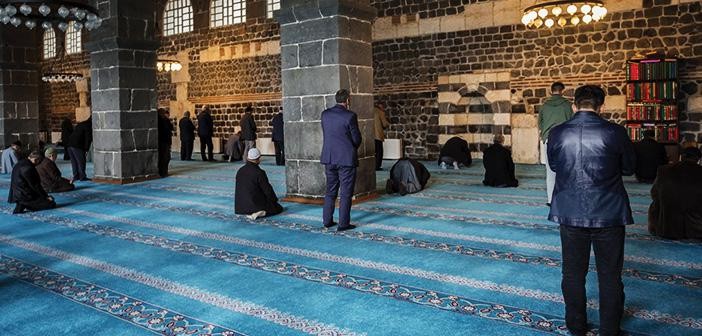
May One Recite Translation Of Surahs In Prayers?
May one recite translation of surahs in prayers?
It is not permissible to recite translations of surahs in prayer. On this issue, it is stated decision number 103 of the High Board of Religious Affairs dated 04.12.1997 as follows:
As it is stated in the Holy Qur’an, “So recite what is easy from it, ...” (Muzzammil, 73/20), Prophet Muhammad (saw) recited the Holy Qur’an in every prayer and told a companion who did not know well how to establish prayer, “... then recite one of the parts from the Qur’an that you remember and is easy for you” while explaining him how to do it (Muslim, Salat, 45). In this respect, qira’at in prayer, which means to recite parts from the Holy Qur’an, is a fardh established by the Holy Qur’an, Sunnah, and ijma (consensus).
As it is known, the Holy Qur’an is the name of the words sent down by Allah to Prophet Muhammad (saw) by means of Jibreel. It was sent down not only with its meaning but also with its words to the heart of Prophet Muhammad (saw). In this respect, what is understood from these words and the meanings expressed in other words are not the Qur’an itself. Because, except the exact words revealed, the meaning expressed in other words, even if it is in Arabic, is not the word of Allah, but it is only the interpretation of the translator. However, the concept of the Qur’an includes not only the meaning but also its words as one of its essential parts.
“And indeed, it [i.e., the Qur’an] is the revelation of the Lord of the worlds.The Trustworthy Spirit [i.e., Gabriel] has brought it down upon your heart, [O Muhammad] that you may be of the warners in a clear Arabic language.” (Shu’ara, 26/192-195); “And thus We have sent it down as an Arabic Qur’an” (Ta-Ha, 20/113); “[It is] an Arabic Qur’an, without any deviance that they might become righteous.” (Zumar, 39/28); “A Book whose verses have been detailed, an Arabic Qur’an for a people who know, ...” (Fussilat, 41/3). and similar ten other verses (Yusuf, 12/2; Rad, 13/37; Nahl, 16/103; Shura, 42/7; Zukhruf, 43/3; Ahqaf, 46/12) clearly express that not only the meaning but also the wording is included in the concept of the Qur’an. For this reason, there is a consensus among Islamic scholars on the fact that its translation cannot be called as the Qur’an and it does not possess the same feature as the Qur’an.
As it is known, translation means transferring the meaning of a word into another language by using its equivalent in the target language. However, every language has its own unique characteristics of expression, tone, and wording. Therefore, except some plain expressions that do not have a literal and emotional aspect, no translation can substitute for the original text and no translation can entirely comply with the original text. Then, the difference between the original of such a book as the Holy Qur’an, which has divine rhetoric and ijaz (miracle/succinctness), and its translation is as great as the difference between the created and the creator. Because one of them is the word of the Supreme Creator Allah and the other is the weak declaration of the created. Would it be possible to replace such a translation with the word of Allah or consider it as being in the same position with the word of Allah?
Besides, Islam is a universal religion. It is a requirement of Islam as a universal religion that all Muslims who speak different languages use a common language in worship.
If everyone starts to perform worships in their own languages, this will be contrary to the way taught by the Prophet (saw) and has been practised until today, and will undoubtedly give rise to some conflicts.
On the other hand, it does not seem possible to select one among more than hundreds of translations on which everyone will agree, without violating the freedom of religion and conscience, in order to be recited in prayers and to make everyone adopt it.
People should not be confused at this point about making dua in their own language. Because dua is a servant’s supplication to Allah. Therefore, it is quite natural that everyone does it in their own language.
On the other hand, one of the most important characteristics of the Holy Qur’an is its ijaz (miraculous character). The Qur’an challenges entire humanity to form a similar book. We cannot say that ijaz only covers its meaning. On the contrary, it is understood from the challenge verses such as “And if ye are in doubt as to what We have revealed from time to time to Our servant, then produce a surah like thereunto.” (Baqarah, 2/23-24; Yunus, 10/37-38; Hud, 11/13; Isra, 17/88; Tur, 52/33-34), that this feature is rather related to its wording.
Moreover, it is clearly understood from the 88th verse of Surah al-Isra which states that a similar book cannot be formed by humans and jinns even if they come together and support each other, and in this respect, a translation cannot be considered as the word of Allah, cannot have the status of it, therefore, its translation cannot be recited in prayers.
Undoubtedly, it is of vital importance and not a difficult job for a Muslim to know at least the meanings of the parts they recite from the Holy Qur’an, and recite these in prayers by understanding and feeling them. Yet, the judgments on translating the Holy Qur’an to understand its meaning, benefit from its guidance, and learn the commands, prohibitions, and recommendations of the Almighty Allah and reading its translation for these purposes are different. The judgment on substituting the Qur’an with these translations and considering them as the Qur’an itself are also different.
The Holy Qur’an is recited with its original wordings in the prayers and as a worship. One may read the translations, meanings and explanations of it in order to learn the recommendations, commands, and prohibitions of the Almighty Allah and to benefit from its guidance. Reading translations and explanations of the Qur’an for this purpose is quite rewarding and is a separate worship in general terms.
Source: Presidency Of Religious Affairs The Turkey, High Board of Religious Affairs FATWAS







